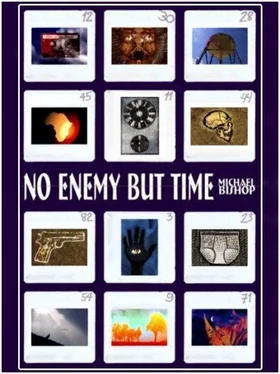“Oh, God,” murmured Monicah, and my heart misgave me.
For two years after the trauma of my involvement with White Sphinx, I had made a good living in the States recounting my adventures for college students, television talk-show hosts, and the readers of Sunday magazine supplements. Because the Air Force and the U.S. government routinely ridiculed my claims, and because I would allow no one with a degree in physical anthropology to examine Monicah, I had been widely regarded as an amusing crackpot. For a time my notoriety grew, bringing me more money, an unwanted retinue of hangers-on, and the curse of instant recognition on any street or side road in my readopted homeland. Then the bottom had fallen out, and I had gone the way of yesterday’s superstar, straight down the lonely cul-de-sac of media neglect to the crumbling brick wall of oblivion.
My mother and my sister’s testimony dismissed as worthless, my amusement value squandered, my livelihood compromised, I had dropped from the semireputable status of a psychic or a newspaper astrologer to the pathetic one of a palmist or a flying-saucer nut. Too proud to accept my mother’s charity, I had briefly, and altogether seriously, considered going back to work for Gulf Coast Coating in the Florida panhandle—whereupon, through a consular official in Washington, D.C., President Tharaka had publicly confirmed my story, chastised the United States Air Force for making me out a liar, and invited me to return to Zarakal. “ I have important work for you to do,” read the portion of the communiqué addressed directly to me; “ please come home.” Grateful for aid from this unexpected quarter (President Tharaka and Alistair Patrick Blair had maintained an impregnable silence for two years), I made haste to emigrate, leaving behind a thoroughly bewildered American public and a rancorous congressional debate about abuses of power in the Pentagon and the executive branch.
In Marakoi I was served with a subpoena hailing me before a Senate investigative committee, but with Mutesa Tharaka’s blessing I ignored it and began laying the groundwork for my campaign for a seat in Zarakal’s National Assembly. After a parade through the capital and a hero’s build-up in the East African press, I ran unopposed. Only two weeks after my election I received an appointment to the cabinet.
Since that time, by hard work and a scrupulous avoidance of the WaBenzi image, I had won the complete respect of my constituents and had reestablished my credibility with American officials in Zarakal.
Although I had long since concluded that President Tharaka had played his Kampa card to win American concessions of which I was still unaware, this suspicion did not compromise my gratitude to him. Monicah and I had finally found our place in the sun. I was the man who had traveled in time, she was a diminutive African Eve, and, as Dirk Akuj had noted that afternoon, we were celebrities whose story had inspired international controversy. Indeed, upon his death, the flamboyant mantle of Alistair Patrick Blair had passed to my daughter and me.
Now, in the dinner theater of the Sambusai Sands, the Gombe Stream Chimps were reenacting one of the final episodes of the Joshua Kampa legend. This “tribute” having been kept a secret from Monicah and me, I had had no chance to approve it beforehand. That was bad. The champagne we had been drinking, along with my own embarrassment, made the mimicry of Lisa Chagula’s chimpanzees seem especially intrusive, a violation of something sacred. I gripped the edge of the table and said nothing. The reenactment would be over soon, and quickly forgotten as other performers and divertissements succeeded it. No point in disrupting the evening with an indignant outburst.
Only the ape impersonating me remained in view, sheltering its baby doll from the myriad swirling tatters of crepe paper. The other chimps had hurried off stage-left when projectors mounted all about the hall threw holographic images of several spotted hyenas into their midst. To the oohing and ahing of the audience these hallucinatory creatures advanced on my pongid counterpart, their eyes scintillating like topazes. Lisa Chagula, on the apron of the stage, pantomimed her sympathetic horror, covering her eyes with her forearm and crouching away to one side. At which point a gaudy mock-up of a lunar module descended from on high—on wires—to rescue Monicah and me. This contraption contained a pair of chimpanzees in show-business spacesuits, who jumped from their craft and began pulling bright yellow fire hoses out its hatch.
“I can’t stand this!” Monicah exclaimed, loud enough to be heard over the clamorous music.
“Do you feel your dignity is being assailed?” asked Rochelle Mutasingwa, as if it were rather late to worry about the matter.
“Not mine, the chimpanzees’.”
“Lisa Chagula and the Gombe Stream Chimps have been Tanzania’s good-will ambassadors for years.
Their dignity has never been questioned.”
“Maybe not,” Monicah replied. “But this is a vulgar exploitation of the little chaps.”
“Exploitation!”
“You heard me. Those chimps are your niggers, Miss Mutasingwa, and the late President Nyerere would never have approved anything so mean and disgusting.”
“Ladies,” said Admiral Cuomo. “Ladies.”
“Your daughter’s remarks go beyond the bounds of adolescent irresponsibility,” Rochelle Mutasingwa told me angrily. “I wonder if they have your approval.”
“No, of course not. Monicah hasn’t been—”
“For God’s sake, Daddy!”
On stage, the Grub and I were climbing into the lunar module with the chimps in the sequin-covered pressure suits. Doused, the crepe-paper streamers lay flat on the floor, while ancient Mount Tharaka, delicately backlit, continued to mutter and spew. Monicah did likewise, using vivid American expressions that I would have thought alien to the vocabularies of her affluent classmates. The lunar module, meantime, ascended on paper flames—and wires—into a canvas empyrean.
When Lisa Chagula and all seven chimps returned from the wings to exult in their triumph, Monicah abruptly stood up and swept her champagne glass to the floor. More monkey business appeared to be in the works, and she was going to have none of it. Fortunately, the darkness cloaking the hall concealed her distress from everyone but those in our immediate vicinity.
“Daddy, I don’t feel well. I’ve got to get out of here.”
I was torn. To desert my guests would be inhospitable, almost a breach of diplomatic etiquette.
However, if Monicah were genuinely ill, I owed it to her to escort her back to our suite. During the entertainment to follow, my absence would be of small consequence to these people.
As the Gombe Stream Chimps initiated a tumbling exhibition, Dirk Akuj pushed back his chair and made a tactful half bow. “At your service, Mr. Kampa. Allow me the honor.”
Alarmed, I tried to protest.
“He’ll do fine, Daddy. Spiffy jacket, polished shoes, a credit to his tribe, whatever it may be.”
“Karamojong, Miss Kampa.”
“Right. A survivor. He’s got to be okay, Daddy. Ta ta. We’ll see you whenever you can tear yourself away.”
Arm in arm, they disappeared together into the multitiered dark. Tim Njeri and another security man would intercept them at the door and accompany them upstairs, but I still did not appreciate the turn that events had taken. Dirk Akuj was a stranger with admitted ulterior motives, and his interest in my daughter, just fifteen today, struck me as ominous, something other than the tardy fibrillations of a young man’s fancy. After all, the Ugandan was not that much younger than I.
* * *
Carrying congratulatory birthday telegrams from Jeannette Monegal and the Whitcombs, I stumbled off the elevator onto the fourteenth floor. It was two-thirty in the morning, and Tim Njeri and Daniel Eunoto were standing sentinel at the door to my suite. Actually, Daniel was in a kind of upright trance while Timothy crouched doggo behind a potted eucalyptus. They might have been ilmoran in the bushveldt rather than security agents in the corridor of a resort hotel.
Читать дальше



![Ally Carter - [Gallagher Girls 01] I'd Tell You I Love You But Then I'd Have to Kill You](/books/262179/ally-carter-gallagher-girls-01-i-d-tell-you-i-lo-thumb.webp)








